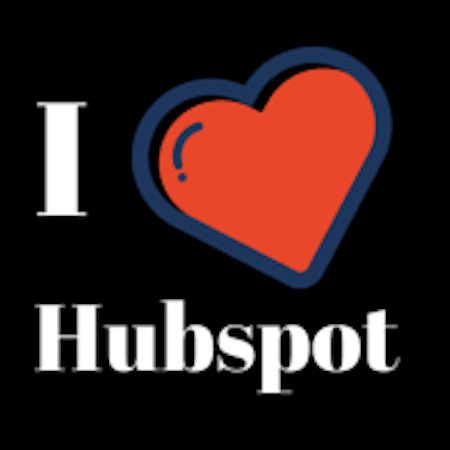I love Hubspot.
If you’ve never heard of Hubspot, it’s a CRM and inbound marketing platform.
Now hold on. You’re probably thinking that I’m going to give you a sales pitch on why you need to use Hubspot. I’m not.
Frankly, I really don’t care if you ever use their software. My point in bringing them up has neither to do with CRM nor you.
[Editor’s Note: Don’t worry, it will have to do with you eventually, but not yet, and not about Hubspot.]
So back to Hubspot. One reason I love them is, of course, because of their technology. But it’s not their technology alone that has powered my passion. Rather, my adoration for them was built from their thoughtful and easily accessible ways in which they teach me how to be a better sales person, a better marketer and, frankly, a better leader.
In a funny way, I feel like Hubspot helps me to be a better person. Which is odd because, well, they’re a CRM company and not, say, my wife, a therapist or a chocolate labrador puppy with soft floppy ears.
The thing Hubspot does that really hugs my heart is that what they say, what they do and what they empower me to do, are all aligned.
For instance, when they tell me how to use a blog to drive more leads, I know they are telling the truth because that’s exactly how they initially attracted me to them – through their blog. Even more, when I try their suggested tactics in my own business, it works just like they promise me it will.
Don’t you just love when things work out like they’re supposed to?

Integrity On Wheels
You know who else I love? Tesla.
Tesla emerged with a central core promise: the auto industry is not progressing fast enough and we can do it better.
They claimed that they were going to build vehicles that were more sleek, more technologically savvy, more eco-friendly and more sophisticated than anything else in the market.
That is what they promised and that is what they delivered.
The moment I witnessed the alignment between what they said and what they did, is the moment I began to trust Tesla and see them as a market leader. That trust, combined with an awe of the vehicles and company operations, evolved into a love for the brand.
Come to think of it, it’s not too different from my love for Nike.
The Swoosh of Trust
Sure you may grumble when I mention Nike. Just remember, this isn’t about you….at least not yet.
I am, and have always been, Nike’s target persona. The Nike image is about digging deep within you and giving everything you’ve got in order to achieve your goal.
They don’t say the shoes are going to make you faster.
They don’t say the clothes are going to make you a star.
They don’t say that if you wear their gear you will be happier, wealthier or wiser.
What they do, arguably better than any other brand in the world, is associate their logo with the feeling of greatness.
The swoosh represents the search for excellence. It doesn’t matter if you finish first, last or anywhere in-between, what matters to the swoosh is that you gave it everything you’ve got to give.

Trust and Integrity
If you haven’t yet picked up on this, there is a related theme that binds my loves for a marketing platform, a car brand and an athletic footwear/apparel company. You know what it is?
If you said the theme is that they all help me feel great about myself, then you’re completely wrong.
Contrary to what I said at the beginning of this diatribe, it’s not about me. The fact that the brands help me feel great about myself is simply a byproduct of what each of the companies are doing.
The theme I’m referring to that binds these three companies is “trust and integrity.” (OK, maybe that’s actually two themes, but they are so closely related that I’m calling them one, so howzabout you just get off my back about it already.)
Hubspot, Tesla and Nike have each gained my trust through their integrity. They deliver exactly what they say they will – not just in their products, but in their voice, their mission and their culture.

Integrity and Trust
My definition of integrity is pretty simple.
Integrity is when there is complete alignment between what you think, what you say and what you do.
If you say one thing and do another, that’s not integrity, it’s hypocrisy. Don’t get me started on hypocrisy.
[Editor’s Note: Seriously, don’t get him started]
We all tend to think of trust and integrity as personality traits. Individuals can have high or low integrity, they’re trustworthy or they are not (or perhaps some grey area in-between).
As it turns out, trust and integrity can also be applied to almost anything that is driven by human involvement, like companies and governments and Quidditch Associations.
Keep in mind, of the companies for which I’ve professed my love, one delivers trust and integrity through a service (Hubspot), another through a product (Tesla) and another through emotion (Nike).
This all relates to brand building and, if you haven’t figured it out by now, is how I’m going to thwack this rubber-band of a banter back into your court.

When Integrity Falls
Integrity is a very important trait in brand building. In fact, think of all the brands you love and how integrity plays an important role.
OK, let me help you.
Let’s take Amazon for instance, the online company who consistently has the highest customer support ratings in the world. Amazon Prime is the best $119 I spend every year. Why? Cause they promise me that my shipping will be free and my package will show up in 48 hours. And whenever I order from them, they deliver on that expectation. Every. Single. Time.
That’s integrity.
Perhaps the best example of integrity lost is Lance Armstrong, the man and the brand.
For at least six years, Lance was perceived as the greatest cyclist – and arguably the greatest athlete – in history. His athletic feats, starting at a young age, seemed to defy logic.
As if that’s not enough, much of his non-athletic energy was focused on raising money and awareness in the battle against cancer. He leveraged his worldwide fame to have a meaningful impact in that arena.
The Lance Armstrong/LiveStrong brands showed us that, with focus and hard work, we could overcome anything and achieve the loftiest of goals. He wasn’t just a hero – he was a superhero. We admired him. We trusted him.
Until, of course, we didn’t.
When we discovered he was cheating, and lying about it, the house of cards crumbled. All the trust and integrity that was built – and an enormous amount was built – it all got decimated overnight. Even the good work he did in his battles against cancer, that got vilified.
He wasn’t the first nor the last athlete to be convicted of doping, but he was the one who had built up a level of trust and integrity in his brand that few other athletes had ever attained.
The moral of this story? Trust and integrity are fragile and, when it comes to a relationship with your consumers, it should not be taken for granted.

Integrity Isn’t Always About Sales
OK, OK…. NOW it’s about you. Or, rather, your company.
In order for your company to build a high level of trust and integrity with consumers, it helps to understand what you’re actually offering (hint: what you’re offering is usually not your product). In order to understand what you’re offering to your consumers, you need to formulate a brand and, with that, a culture.
As Howard Schultz, the former CEO of Starbucks, has said: “If people believe they share values with a company, they will stay loyal to the brand.”
I’ve talked with many different owners of small businesses and have asked them to define their brand for me.
They usually pause.
I always know why they are pausing. It’s because they are trying to come up with an answer beyond “I don’t know.”
—
It is common for growing companies to neglect the work that goes into defining their brand value, brand purpose and brand positioning. Small companies often just focus on a shoot-from-the-hip sales mentality. I completely get that – I’ve definitely led some of those companies. When it’s all about growing revenue, it’s sometimes hard to take a step back.
But trying to sell a product without knowing the brand value and positioning is like throwing darts in the dark. Eventually, with enough darts thrown, you’re going to hit a target, you just won’t know how you did it.
Here’s the secret that is recognized by all the strongest brands in the world:
Trusting the brand is more important than the sale. (At least until you have a brand built.)
I know that’s a scary thing to think about – building a brand. When you’re used to a tactic that can best be described as “pry until they buy”, it can be anxiety provoking to think you need to take a step back.
But if you want to grow, you do need to do this.
Do you know what your brand represents?
How do people describe your company to their friends?
What are you doing to maintain integrity and build trust in the marketplace?
Brand building is not always an easy thing to do. Enlightening, yes. Easy, no. It requires opening up your mind to who you are and who you want to be – and then setting a plan on how you are going to get there. It requires patience and dedication and a belief that you’re doing the right thing.
But trust me, you’re doing the right thing.
Somewhat Relevant Quote
“Today power is gained by sharing knowledge, not hoarding it.“
Dharmesh Shah, co-founder/CTO of Hubspot
Random News
RGB – She’s gone, but she’s still determining your fate
Cuzzins – Your oldest ancestor was just found
Robbery – This might be the best instance of breaking and entering ever
Pretty – Somebody loves colors so much they spent the time to make this website
